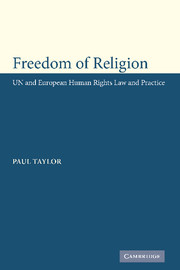Book contents
- Frontmatter
- Contents
- Foreword by David Harris
- Preface
- Table of cases, applications, and communications
- Table of treaties, declarations, and other international instruments
- List of abbreviations
- 1 Introduction
- 2 Freedom of religious choice
- 3 The scope of the forum internum beyond religious choice
- 4 The right to manifest religious belief and applicable limitations
- 5 Conclusion
- Annexes
- Bibliography
- Index
2 - Freedom of religious choice
Published online by Cambridge University Press: 14 January 2010
- Frontmatter
- Contents
- Foreword by David Harris
- Preface
- Table of cases, applications, and communications
- Table of treaties, declarations, and other international instruments
- List of abbreviations
- 1 Introduction
- 2 Freedom of religious choice
- 3 The scope of the forum internum beyond religious choice
- 4 The right to manifest religious belief and applicable limitations
- 5 Conclusion
- Annexes
- Bibliography
- Index
Summary
Introduction
The focus of this chapter is principally that part of the forum internum concerned with the freedom of each individual to choose a particular religion, to maintain adherence to a religion or to change religion altogether at any time, and the right to be free from restrictions or coercive forces that impair that choice. Personal choice in such matters is unrestricted for reasons of principle and because of the impossibility of providing otherwise. Pfeffer had this in mind when commenting, ‘as the common-law adage has it, the devil himself knows not the thoughts of man’. Similarly, as Krishnaswami noted, ‘[f]reedom to maintain or to change religion or belief falls primarily within the domain of the inner faith and conscience of an individual. Viewed from this angle, one would assume that any intervention from outside is not only illegitimate but impossible.’
Nevertheless, the right to freedom of choice of religion or belief has been one of the most controversial and contested aspects of the right to freedom of thought, conscience or religion. The different formulations of the freedom found in United Nations texts reflect differences in emphasis and intention between those States, on the one hand, which sought unrestricted freedom for the individual to change religion (without considering it necessary to contemplate a right to ‘maintain’ a religion) and, on the other hand, those for whom a right to maintain religion was paramount.
- Type
- Chapter
- Information
- Freedom of ReligionUN and European Human Rights Law and Practice, pp. 24 - 114Publisher: Cambridge University PressPrint publication year: 2005



